
finite and non finite verbs english esl worksheets for distance learning and physical classrooms
20 Examples of Finite Verb November 3, 2021 A sentence has a verb called the main verb. Every sentence needs a finite verb to complete its structure. The main verb used in every sentence will function as a finite verb. Examples of Finite Verbs in Sentences She completes her assignments at the given time.
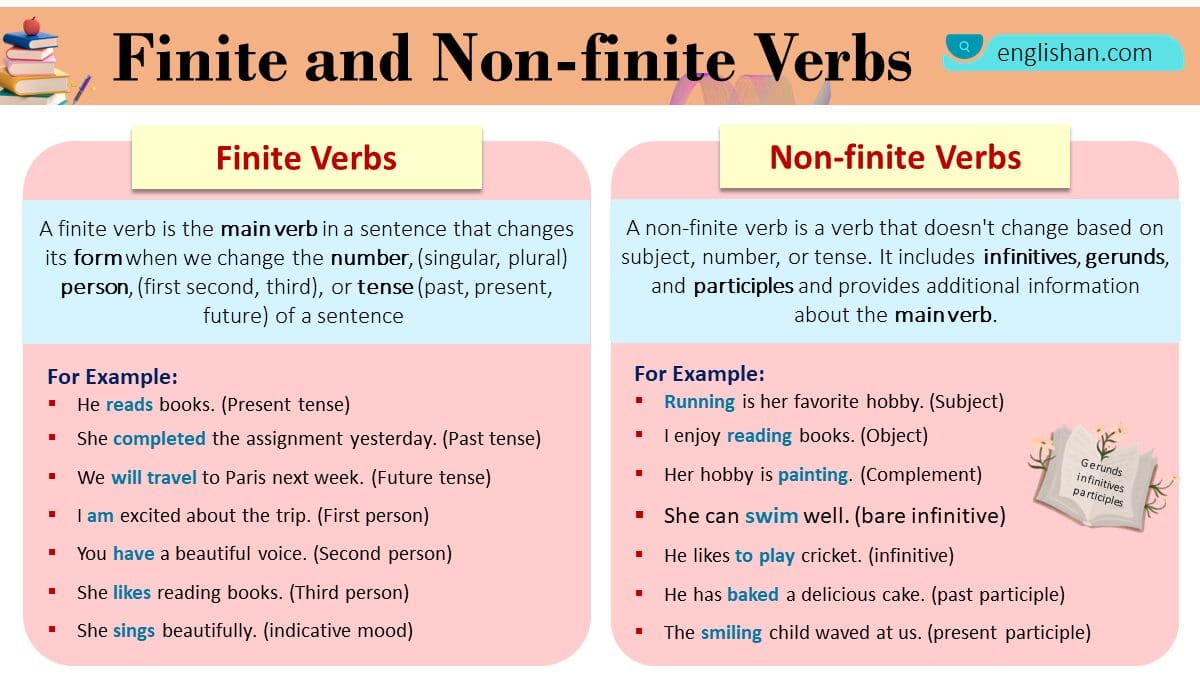
Finite and Nonfinite Verbs in English with Examples • Englishan
Examples In the following sentences, the finite verbs are emphasized, while the non-finite verb forms are underlined. Verbs appear in almost all sentences. This sentence is illustrating finite and non-finite verbs. The dog will have to be trained well. Tom promised to try to do the work. The case has been intensively examined today.

Finite Verb Definite, Rules, Examples, and List Verb examples, Teaching english grammar
For example, the verb "walked" in the sentence "I walked to the store" is a main verb. Auxiliary verbs are used to help main verbs. They can indicate tense, mood, or aspect. For example, the verb "has" in the sentence "I have walked to the store" is an auxiliary verb. Examples of finite verbs. Here are some examples of finite verbs:
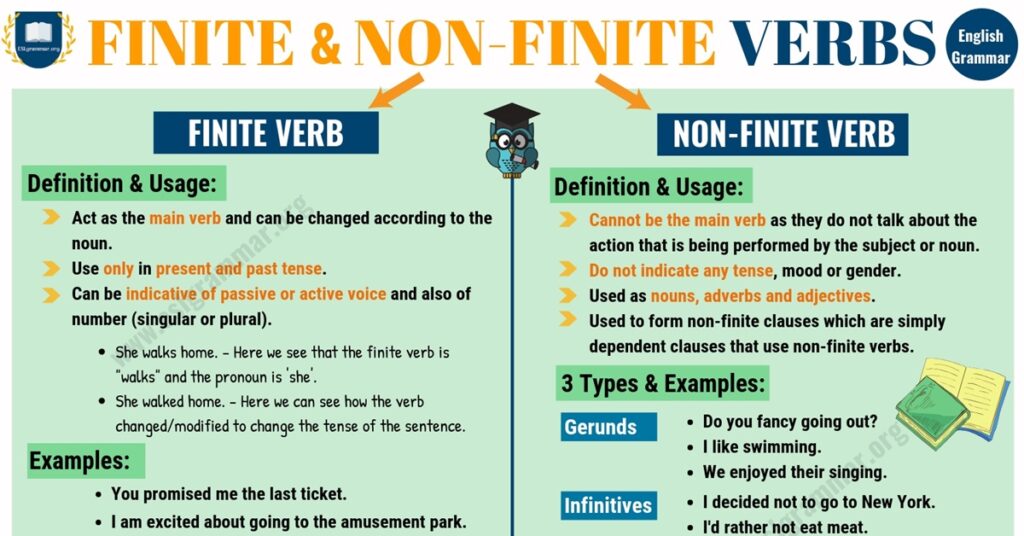
Finite and NonFinite Verbs Definition, Useful Rules & Examples ESL Grammar
A finite verb is a verb that is used to indicate tense and subject agreement in a sentence. It is called finite because it has a specific form that is limited by the number and person of the subject. It is also known as a main verb, as it is the primary verb that conveys the meaning of the sentence. Finite verbs are used to express action or.

20 Examples of NonFinite Verb English phrases, English phrases idioms, English vocabulary
20 examples of finite verb and example sentences: Tommy is angry. (The "is" in this example is known as the finite verb. The subject is "Tommy." The time given in this sentence is the current tense.) Elissa painted the her home. (The word "painted" in this example functions as a finite verb.
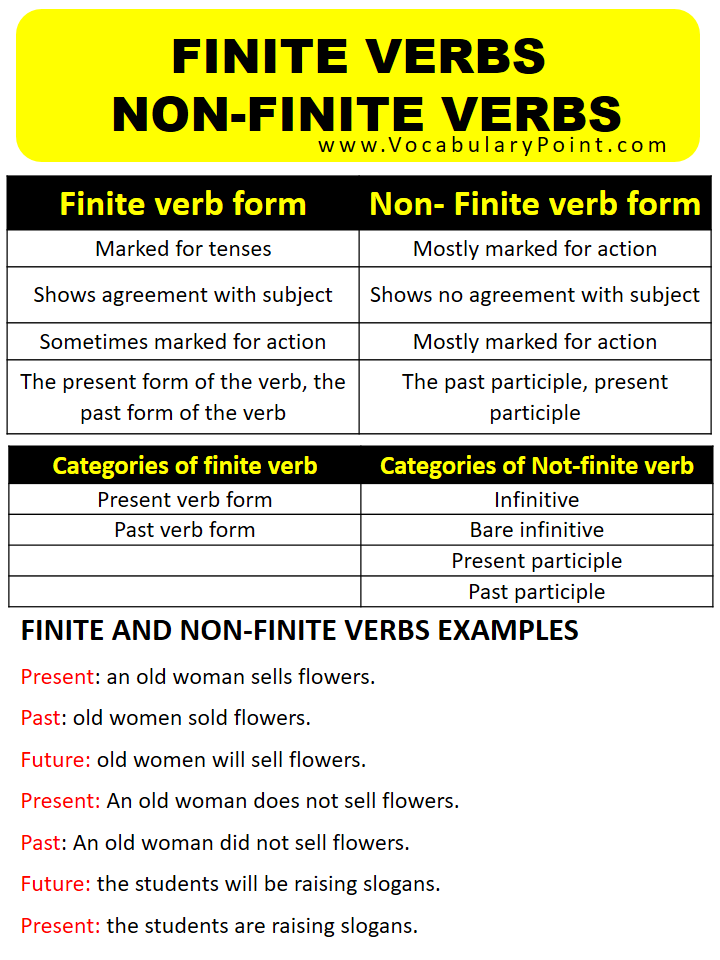
FINITE AND NON FINITE VERBS EXAMPLES Vocabulary Point
These verbs are utilitarian, helping to convey the mode or mood of the main verb in a sentence. Common modal auxiliary verbs include "can," "could," "will," "would," "must," "shall," "should," "may," and "might.". Despite their auxiliary status, modal verbs are considered finite because they perform the.
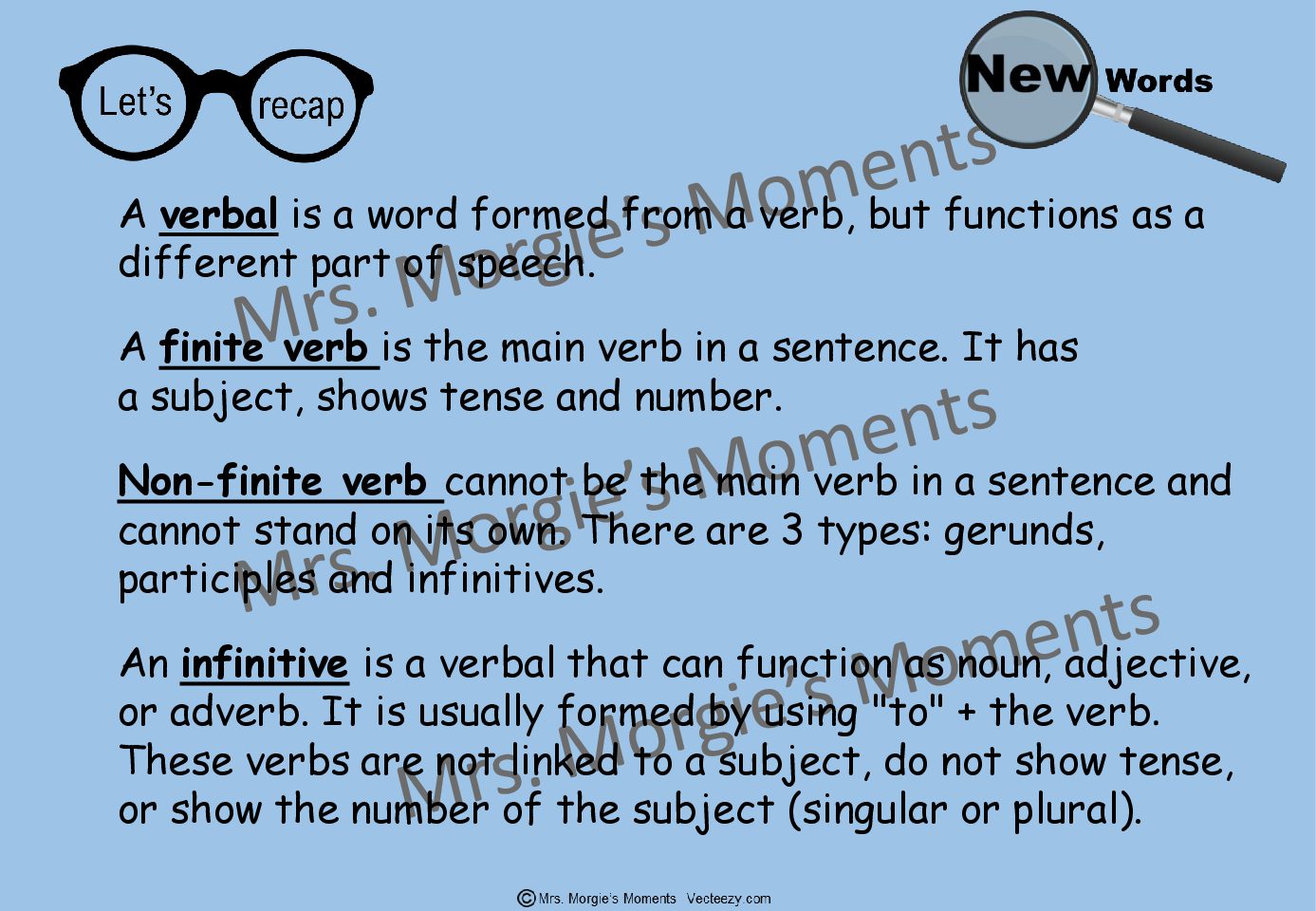
finite and non finite worksheet english esl worksheets for distance learning and physical
Following are the examples showing the use of finite verbs in the sentence: He painted all the walls. I. 14 - speak, 15 - promised, 16 - excited, 17 - travelled, 18 - went, 19 - loves, 20 - love. Related Information: Verb Regular Verb Irregular Verb Subject-Verb Agreement Modal Auxiliary Verbs Intransitive Verbs Transitive.

English PowerPoint Finite and Infinitive Verbs Intermediate Phase • Teacha!
Examples of Finite Verbs It's easier to find finite verbs in a sentence than it seems. No matter how long or short the sentence is, there is always at least one finite verb. Orlando swims three times a week. I cooked dinner last Thursday. Shawna is a teacher. We had a chemistry lesson yesterday. Our study group worked really late last night.

Finite verb with examples Helping verbs, Linking verbs, Main verbs
Examples of Finite Verb: We spend a great amount of time together and we want to do it forever. Don't just sit there idly when you should take the first move. Don't lie when someone asks you a serious question. He did not show me the chocolate until I begged him to do so. I could not believe that he could bring chocolates for me.

Nonfinite Verbs Infinitive Types, Uses and Examples
Finite Verbs. Finite verbs are those verbs in a sentence that take a subject and have a tense. They are not a category of verb. Instead they refer to the form that the verb is taking. So all verbs can be finite, it just depends what function they have in the sentence. Take for example the verb 'to go'.
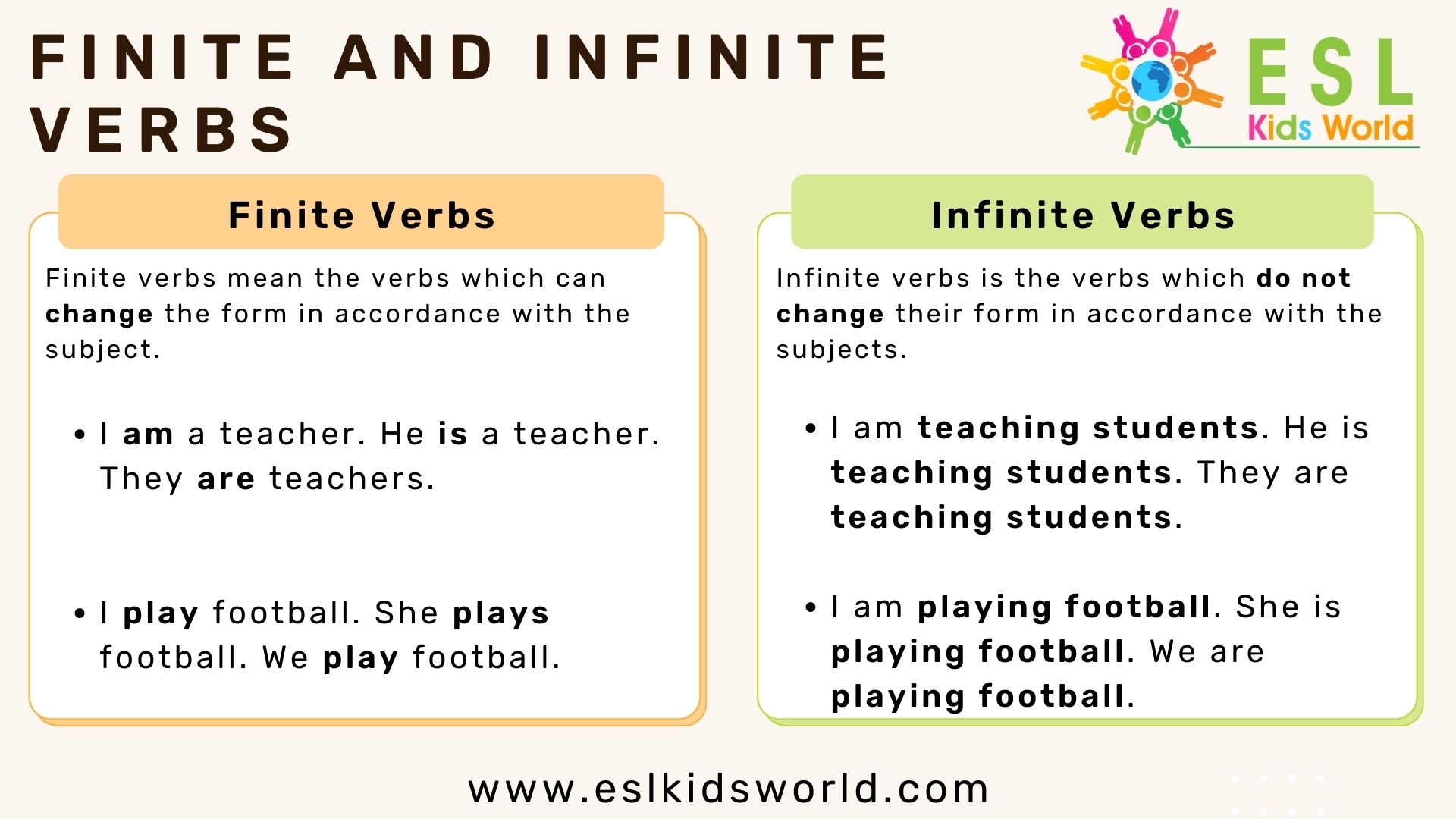
💋 Non finites in english grammar. non. 20221108
25 Finite Verb Examples: Sentences, Uses, And Detailed Explanations By Anwesha Bandopadhyaya Finite verbs are words that put an end to any action, bound or limit it. It is the form that appertains a number or person. Here we are listing down 25+ Finite Verb examples used in sentences.

20 examples of non finite verb Brainly.in
The infinitive form of a verb (such as "to get" in the example above) is also known as the base form, and is often introduced by a main verb and the word "to," as in this sentence: He wanted to find a solution. The participle form appears when the perfect or progressive tense is used, as in this sentence: He is looking for a solution.

Nonfinite Verb Definition, Examples, and List Verb, High school life hacks, English grammar
20 Examples of Finite Verbs Check Your Understanding of Finite Verbs Frequently Asked Questions on Finite Verbs in English What Is a Finite Verb? A finite verb is often the main verb in the sentence, which denotes the primary action done by the subject in a particular context.

Finite Verbs & Nonfinite Verbs Useful Rules & Examples Efortless English
20 Examples of Finite Verbs Test Your Understanding of Finite Verbs What Is a Finite Verb? A finite verb typically serves as the main verb in a sentence. It signifies the primary action performed by the subject within a specific context.

Finite Verbs What Are Finite Verbs? in 2021 Verb, Grammar reference, Easily confused words
Finite Verb The finite verb is also called the limited verb or the actual verb, which is the background of the sentence responsible for the tense formation. They have a definite relation with a subject or a noun of a sentence and are also changed accordingly to the noun.
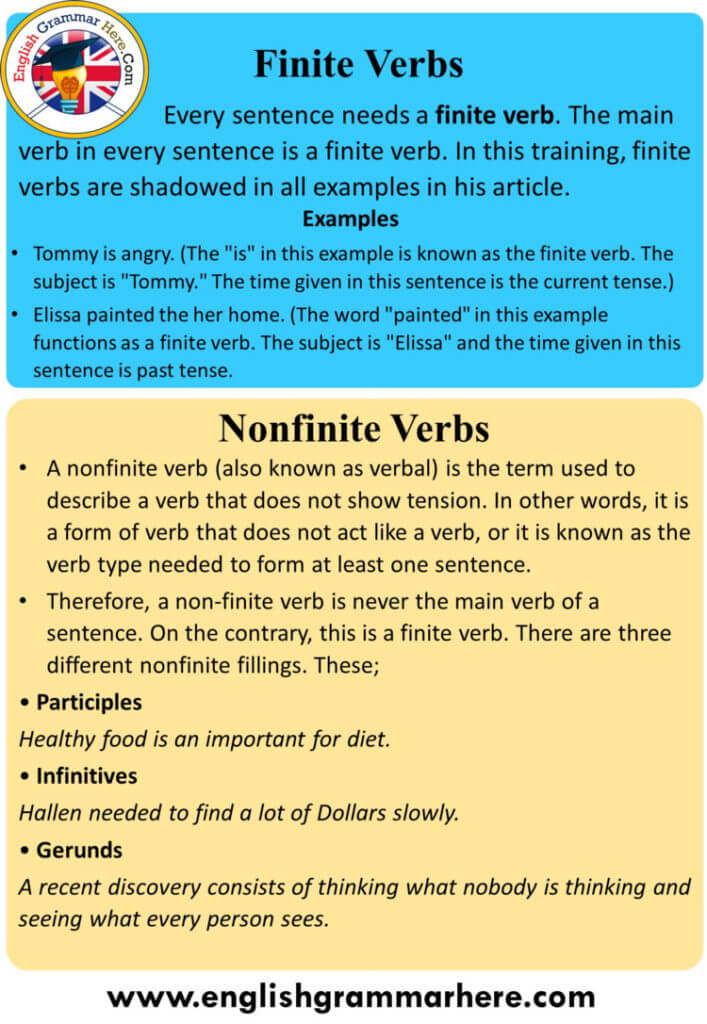
20 examples of finite verb, Definition and Example Sentences English Grammar Here
Rules of Finite Verb Use. Finite verbs are easy to locate in a sentence since every sentence has one. Take a look at these simple rules to help you remember how to use them and to help you find them in both dependent and independent phrases. Rule #1. Finite verbs require a tense, and many take on an -ed or -d at the end of the word to indicate.